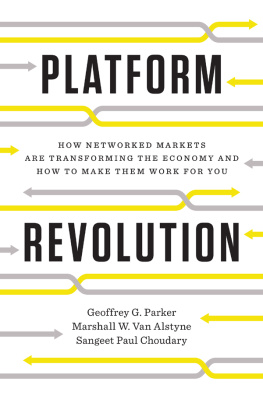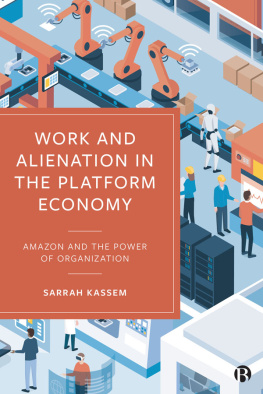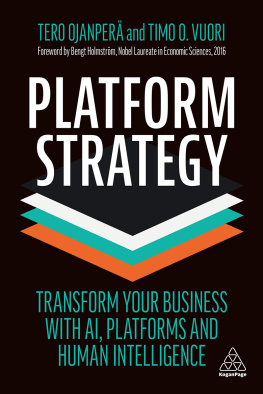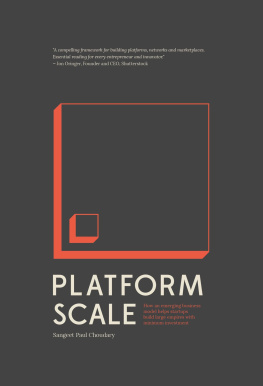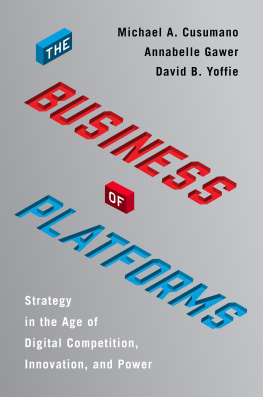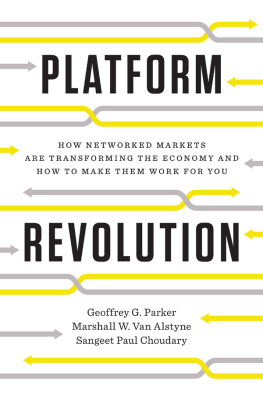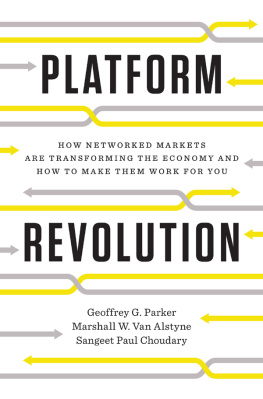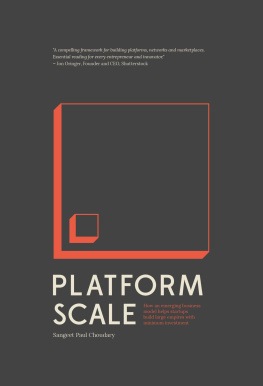
PLATFORM
REVOLUTION
HOW NETWORKED MARKETS
ARE TRANSFORMING THE ECONOMY
AND HOW TO MAKE THEM WORK FOR YOU
Geoffrey G. Parker,
Marshall W. Van Alstyne, and
Sangeet Paul Choudary

Copyright 2016 by Geoffrey G. Parker,
Marshall W. Van Alstyne, and Sangeet Paul Choudary
All rights reserved
First Edition
For information about permission to reproduce selections from this book,
write to Permissions, W. W. Norton & Company, Inc.,
500 Fifth Avenue, New York, NY 10110
For information about special discounts for bulk purchases, please contact
W. W. Norton Special Sales at specialsales@wwnorton.com or 800-233-4830
Book design by BTDnyc
Production manager: Anna Oler
ISBN 978-0-393-24913-2
ISBN 978-0-393-24912-5 (e-book)
W. W. Norton & Company, Inc.
500 Fifth Avenue, New York, N.Y. 10110
www.wwnorton.com
W. W. Norton & Company Ltd.
Castle House, 75/76 Wells Street, London W1T 3QT
To the memory of my mother, Mary Lynn Goodrich Parker.
For my A., my X. and my E.
For Devika, for always being there.
CONTENTS
Platform Revolution is our attempt to provide the first clear, complete, authoritative guide to one of the most important economic and social developments of our timethe rise of the platform as a business and organizational model.
The platform model underlies the success of many of todays biggest, fastest-growing, and most powerfully disruptive companies, from Google, Amazon, and Microsoft to Uber, Airbnb, and eBay. Whats more, platforms are beginning to transform a range of other economic and social arenas, from health care and education to energy and government. No matter who you are or what you do for a living, its highly likely that platforms have already changed your life as an employee, a business leader, a professional, a consumer, or a citizenand are poised to produce even greater changes in your daily life in the years to come.
Over the past two decades, we have come to recognize that powerful economic, social, and technological forces are transforming our world in ways that few people fully understand. Weve dedicated ourselves to studying those forces and how they workhow they are disrupting traditional companies, upending markets, and altering careers, and how they are being leveraged by startup businesses that are using them to dominate traditional industries and launch new ones.
Realizing that the platform business model is the leading embodiment of these forces, we began branching out from our academic and corporate backgrounds to work closely with companies that are deeply engaged in creating platform businesses, including Intel, Microsoft, SAP, Thomson Reuters, Intuit, 500 Startups, Haier Group, Telecom Italia, and many others. Well recount their stories in the pages that follow.
Our goal in writing this book is to solve a number of puzzles posed by the rapid rise of the platform model. These puzzles include:
How have platform businesses such as Uber and Airbnb managed to disrupt and dominate vast traditional industries within just a few years of their own launch? (We address this question throughout the book, and focus on it especially closely in .)
How can platform businesses outcompete traditional companies while employing just a tiny fraction of the number of people the incumbents employ? (See .)
How has the rise of the platform transformed the principles governing economic growth and business competition? How do platform businesses resemble the industrial giants of the pastand how do they differ? (See .)
How and why have specific companies and business leaders soared to the heights of success, plummeted to the depths of failureor bothas a result of their use, or misuse, of platform business methods? Why did Blackberry fall from 49 percent market share to 2 percent in just four years? How did Steve Jobs fumble his companys platform-model choices in the 1980s and then get them dramatically right in the 2010s? (See .)
How do some companies solve the challenge of attracting producers and consumers to a new platform simultaneously, while others fail miserably? Why is free pricing sometimes a brilliant business move, and sometimes a fatal error? (See .)
Why do competitive markets flourish in some platform arenas, while in others winner-take-all markets dominated by a single platform swiftly emerge? (See .)
As platforms grow, they are subject to abuse: customers shopping on eBay can be defrauded, women seeking dates on Match.com can be assaulted, homes rented on Airbnb can be ransacked. Who should pay the price? And how should platform users be protected? (See .)
In answering questions like these, weve sought to create a practical guide to the new economy that is reshaping the world in which we all live, work, and play. Platform Revolution is an outgrowth of three careers that have been spent immersed in studying and unraveling the mysteries of the platform model.
Two of the authorsGeoff Parker and Marshall Van Alstynebecame interested in the emerging network economy during the dot-com boom of 19972000, when both were PhD students at MIT. Those were heady times. The NASDAQ stock index spiked by more than 80 percent as venture capitalists poured investment money into startups boasting cool new technologies and names featuring the prefix e or the suffix com . With traditional metrics of business success seemingly rendered obsolete, several companies launched hugely successful initial public offerings (IPOs) without ever having made a dime in profit. Students and faculty alike were dropping out of school to launch fledgling technology businesses.
Inevitably, the market came crashing down. Beginning in March 2000, trillions of dollars worth of paper valuations vanished in a matter of months. Yet amid the rubble, certain companies survived. While Webvan and Pets.com disappeared, Amazon and eBay survived and thrived. Steve Jobs, who had lost Apple to mistakes he made earlier, recovered, returned to Apple, and built it into a juggernaut. Eventually, the online world emerged from the depths of the 2000 downturn to become stronger than ever.
Why were some Internet-based businesses successful while others were not? Were the differences a matter of random luck, or were deeper design principles at work? What are the rules of the new economics of networks? Geoff and Marshall set about trying to answer these questions.
It turned out to be a harder challenge than they expected. They ended up having to develop a new economic theory of two-sided networks. Their Harvard Business Review article Strategies for Two-Sided Markets, coauthored with Harvard professor Thomas R. Eisenmann, laid out what became one of the most widely taught theories of Internet business, one that is still taught in MBA programs around the world. Along with the work of other scholars, Geoffs and Marshalls insights helped to reshape mainstream thinking about business regulation. Later, at the MIT Initiative on the Digital Economy, they furthered their work with such firms as AT&T, Dun & Bradstreet, Cisco, IBM, Intel, Jawbone, Microsoft, Salesforce, SAP, Thomson Reuters, and many others.
The third author of this book, Sangeet Choudary, was a high school student during the dot-com boom of the 1990s, but he was already fascinated by the immense power of the Internetparticularly its power to create business models capable of rapid, scalable growth. Later, while working as the head of innovation and new ventures at Yahoo and Intuit, Sangeet started digging deeper into the factors that spell success or failure for Internet startups. His research on business model failure, coupled with his conversations with venture capitalists and entrepreneurs, helped him identify the increasing importance of a new and massively scalable business model: the platform.
Next page
